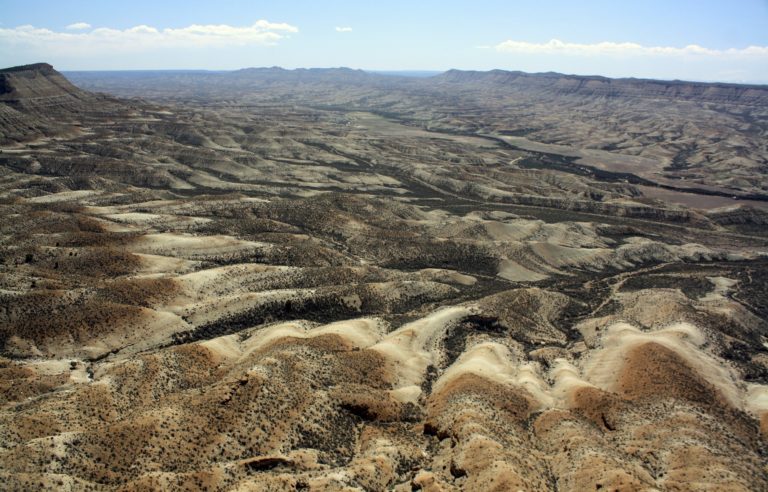Massive Utah Oil Shale Project Threatens Public Health, Water Supply
By: Waterkeeper Alliance

Conservation groups today formally opposed the Trump administration’s plan to facilitate the first commercial oil shale development in the United States, a massive Utah project that would generate enormous greenhouse gas and deadly ozone pollution in regions already exceeding federal air-pollution standards.
The Bureau of Land Management plans to grant the Estonia-owned Enefit American Oil rights of way to build water, gas, electric and oil-product lines to its 13,000-acre strip-mining “South Project” on private land. In total Enefit has 30,000 acres of private, state and public-land leases in the Uintah Basin. The land contains an estimated 2.6 billion barrels of kerogen oil, and its extraction would require pumping billions of gallons from the Colorado River Basin.
“This plan would turn plateaus into strip mines, pull precious water from our rivers, and cause dangerous climate and ozone pollution. It’s everything the Colorado River Basin doesn’t need,” said John Weisheit, a river guide and the conservation director of Living Rivers. “The BLM should dump this plan and stop wasting time and money by propping up Enefit’s wild speculation.”
“The Colorado River Basin is in crisis thanks to water shortages caused by overallocation, mismanagement, and devastating climate change,” said Daniel E. Estrin, advocacy director at Waterkeeper Alliance. “Enabling development of one of the most carbon and water-intensive dirty fuel projects in the nation in the Upper Colorado River Basin will only exacerbate the decline of our waterways and our climate.”
The South Project would produce 547 million barrels of oil over three decades, spewing more than 200 million tons of greenhouse gas — as much as 50 coal-fired power plants in a year. The amount of energy it takes to mine and process oil shale make it one of the most carbon-intensive fossil fuels on Earth.
“This project would be a climate and health disaster,” said Taylor McKinnon of the Center for Biological Diversity. “The last thing the Colorado River Basin needs is a new fossil fuel industry warming the climate, sucking rivers dry and choking communities with more deadly ozone pollution.”
The BLM refused to look at the air, climate and other potential damage from the development, claiming that Enefit would build the project even without the rights of way. But in fact Enefit would be financially and technically unable to build the project otherwise. Ignoring the development’s potential environmental damage violates the National Environmental Policy Act.
“Oil shale is a dirty fuel that does not deserve a foothold on our public lands,” said Alex Hardee, associate attorney at Earthjustice. “BLM’s action will facilitate depletion of the Upper Colorado River watershed, increased smog pollution in the Uinta Basin, the destruction of wildlife habitat, and substantial greenhouse gas emissions.”
“Without BLM’s approval of rights-of-way across public lands, Enefit would need to truck water, natural gas, and processed oil—more than one truck every 80 seconds for 30 years,” said Grand Canyon Trust staff attorney Michael Toll. “Without this federal subsidy, it’s unlikely Enefit could afford to move forward. Why should Americans subsidize an otherwise unfeasible oil shale project, especially when BLM has yet to comply with the National Environmental Policy Act’s mandate to fully analyze and inform the public of the impacts of Enefit’s proposed project?”
The project would double oil production in the Uintah Basin and refine that oil near Salt Lake City, worsening ozone pollution in both areas. In May the Environmental Protection Agency determined that air pollution in the Uintah Basin and Salt Lake City exceeds federal health standards.
“The Uinta Basin suffers from some of the worst air quality in the nation,” said Landon Newell, a staff attorney with the Southern Utah Wilderness Alliance. “BLM’s kowtowing to the fossil fuel industry is largely to blame for the current crisis and its approval of this energy intensive, environmentally destructive, boondoggle of a project will only worsen the problem.”
“A pollution crisis will inevitably lead to a public health crisis, and there is preliminary evidence that one may already be occurring with high rates of perinatal deaths in the Uinta Basin,” said Dr. Brian Moench, board president of Utah Physicians for a Healthy Environment. “The health risks go well beyond ozone and particulate pollution. Although VOCs are not addressed by EPA national standards, they likely represent the greatest toxicity to the population, especially for infants and pregnant mothers.”
“The last thing we need is an Estonian oil company using Americans’ public land to prop up destructive oil shale mining. Yet the Trump Administration’s BLM failed to give this dirty energy subsidy the hard look it demands,” said Jacob Eisenberg of the Natural Resources Defense Council. “Enefit is a company with an extraordinarily dubious environmental track record; NRDC opposes its proposal for the harm it could do to our natural heritage, climate, and public health.”
Enefit’s oil-shale operation would draw more than 100 billion gallons of water from the Colorado River Basin over the next three decades, threatening endangered fish recovery and exacerbating flow declines in the Green and Colorado rivers downstream. The project would also generate more than 450 million cubic feet of waste rock every year, much of it toxic.
“Now is the time to accelerate the transition to clean energy, not to sacrifice our water, air quality, and climate for an investment in one of the dirtiest fossil fuels on the planet,” said Sierra Club beyond dirty fuels associate director Cathy Collentine. “The Sierra Club and our allies will continue to fight to ensure that this dirty mining project never goes forward.”
The BLM is moving forward with this development even as the Colorado River Basin suffers climate-driven river flow declines, record droughts and wildfires.